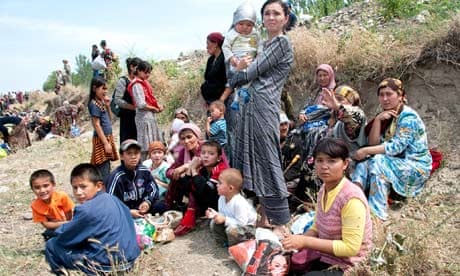Mobs of Kyrgyz men rampaged through southern Kyrgyzstan today, slaughtering ethnic Uzbeks and burning down houses in a third day of ethnic bloodshed.
The country's interim government granted its security forces shoot-to-kill powers and promised to send a volunteer force to the region – but the violence continued to rage, taking the death toll since Thursday night to more than 100.
At least 1,100 have been wounded in what are the country's worst ethnic clashes in 20 years.
More than 75,000 terrified ethnic Uzbeks, mostly women and children, flooded across the nearby border with Uzbekistan today. Many of the refugees had gunshot wounds, according to the Uzbek emergencies ministry.
Gunfire could still be heard in the southern city of Osh, Kyrgyzstan's second city, and witnesses described scenes of horror and panic.
"God help us … they are killing Uzbeks like animals. Almost the whole city is in flames," Dilmurad Ishanov, an Uzbek human rights worker, told Reuters by telephone.
Much of the city was left in ruins after fires set by rioters swept through Uzbek areas, while the few remaining members of the city's large Uzbek minority barricaded themselves in against Kyrgyz gangs.
Many residents were hiding in cellars, food was running out and large parts of the city were reported to be without gas and electricity.
An Associated Press reporter who visited the border witnessed people fleeing and saw the bodies of children who had been killed in the stampede.
"The sky above Osh is black. The army isn't at all in control. We don't know what to do," one resident told Kyrgyzstan's AKIpress news agency.
"The authorities in Bishkek simply don't know what's going on here. We're not just talking about looting but total destruction. By the time troops arrive, there will be no one left to save." Gunfire was also reported in another southern city, Jalalabad, where a mob burned a university, besieged a police station and seized an armoured vehicle and other weapons from a local military unit yesterday.
Thousands of Kyrgyz men, brandishing sticks, metal bars and hunting rifles, gathered at the city's horseracing track, shouting anti-Uzbek slogans.
In a statement, the interior ministry said it would send a volunteer force to the south because the situation in the Osh and Jalalabad regions – strongholds of the ousted president, Kurmanbek Bakiyev – remained "complex and tense".
Yesterday, Kyrgyzstan's interim leader, Rosa Otunbayeva, called on the Russian president, Dmitry Medvedev, to intervene militarily. Admitting that her government had lost control of the situation in the south, she said outside forces were needed to restore order.
Opponents of the new government said it had failed to impose political stability, and was letting the country drift towards civil war.
"We have our own resources. We have our own armed forces. We don't need to ask the Russians to deal with the situation," said Miroslav Niyasov, former head of the country's security council. "Unfortunately, our government isn't up to the job."
The Kremlin said it had no immediate plans to send troops, but today 300 Russian paratroopers were dispatched to reinforce security at its air base in Kant, in the north of Kyrgyzstan.
Any prospect of a large-scale Russian military intervention would cause concern for the White House. The Manas airbase, near Kyrgyzstan's capital, Bishkek, is a crucial supply post for US forces fighting in nearby Afghanistan. Moscow has its own military airbase near Bishkek.
Russian officials said Moscow would consult its regional allies tomorrow over what measures it might take.
They said Russia – which regards central Asia as its backyard and is keen to limit US influence in the region – would only act in conjunction with the UN.
The disturbances are the most serious since April's street revolution ousted Bakiyev. The president fled the country after his troops opened fire in Bishkek, killing at least 85 unarmed protesters, and is now in Belarus. His supporters in the south of the country seized several government buildings last month.
From his self-imposed exile in Belarus, Bakiyev issued a statement denying any role in the violence and blaming the interim authorities for failing to protect the population.
"The Kyrgyz republic is on the verge of losing its statehood. People are dying and no one from the current authorities is in a position to protect them," he said.
Analysts said the pro-Bakiyev counter-revolutionary movement in southern Kyrgyzstan had rapidly evolved into a ferocious ethnic conflict.
The region was the scene of inter-ethnic rioting during the breakup of the Soviet Union in the 1990s. Around 1,000 people were killed when Kyrgyzstan's Uzbek minority tried to gain autonomy and join neighbouring Uzbekistan. The fear is that ethnic tensions may erupt across the region.
Lilit Gevorgyan, an expert with Global Insight, said the territorial dispute "seems to be coming back to life again".
"The Osh Uzbeks have found unlikely partners in ousted president Bakiyev's Kyrgyz supporters, who are happy to join forces with any group antagonistic towards the northern revolutionary government in the capital," Gevorgyan said.
